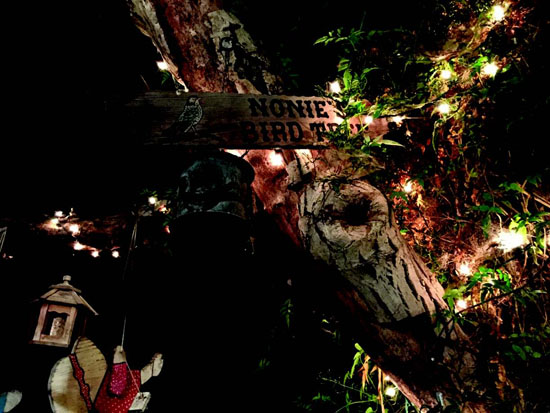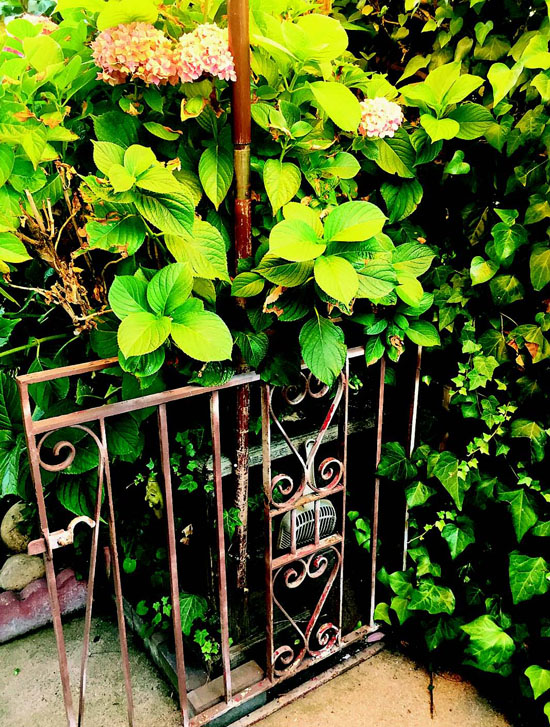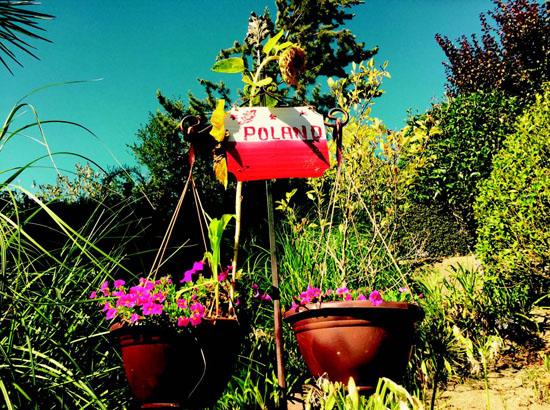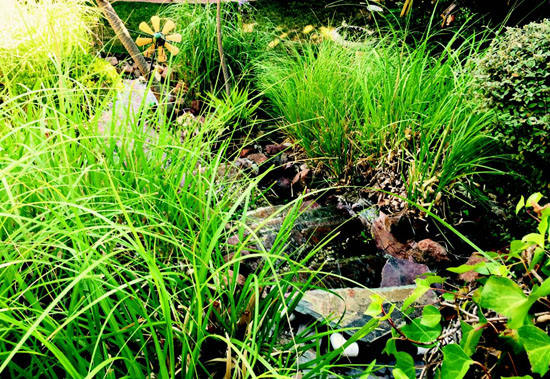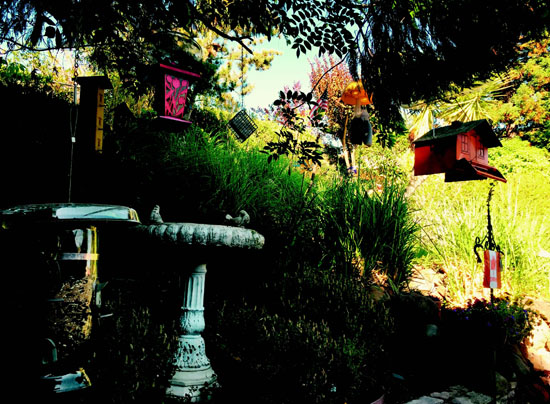 | | | A plethora of colorful homemade bird houses, feeders, and baths adorn Tom Gieryng's garden. Photos Cynthia Brian | | | | | | Everyone seems to love the birds. After reading my previous month's column, "For the Birds," many people contacted me with stories of the birds in their gardens including hardwood floor installer and refinisher, Tom Gieryng. He sent me photos and asked me to come see the numerous avian amenities he had installed in his garden. Birdhouses, bird feeders, fountains, and perches occupy every tree, wall, and crevice. Most were built by Gieryng, many were someone else's trash turned into Gieryng's treasure, and all of them have been embellished, hand painted, or given a touch of whimsy. Gieryng gave new life to tossed out items including wrought iron gates, hanging baskets, pots, tricycles, and even stained glass windows with his garden ingenuity.
 Growing up in Poland, Gieryng was like most teens across the world. He looked forward to making enough money to buy nice clothes and go out with friends to party. His job was with a wood flooring company and at the time he didn't realize this teenage occupation would become his life-long career when he immigrated to America. After a few years of working for a flooring business in San Francisco, Gieryng wanted more creativity and control and opened his own company, TG Hardwood, where he was able to implement his own designs. Curiosity and a desire to reclaim discarded objects fuels his inventive nature both in his woodwork and outdoor spaces. After a hard day's work, he finds inspiration, entertainment and relaxation in his garden.
Growing up in Poland, Gieryng was like most teens across the world. He looked forward to making enough money to buy nice clothes and go out with friends to party. His job was with a wood flooring company and at the time he didn't realize this teenage occupation would become his life-long career when he immigrated to America. After a few years of working for a flooring business in San Francisco, Gieryng wanted more creativity and control and opened his own company, TG Hardwood, where he was able to implement his own designs. Curiosity and a desire to reclaim discarded objects fuels his inventive nature both in his woodwork and outdoor spaces. After a hard day's work, he finds inspiration, entertainment and relaxation in his garden.
 Gardens offer each of us a place to chill out, relax and be inventive. In today's high tech environment, the garden presents an instant environment to unplug, unwind and be imaginative. When I'm in my garden, I lose track of time. Although pulling weeds, turning the soil, planting, pruning, watering and paying attention to potential pests is work, it is invigorating, offering me precious time to think without the distraction of phones, emails and pinging calendar appointments. Our gardens can be an extension of our artistic selves when we allow ourselves to be inquisitive. In my mother's garden, an ancient walnut tree has become Nonie's Bird Tree. She hangs feeders of all shapes and sizes attracting a variety of birds and hummingbirds. Vines twine around a rusted chicken chair in my front yard next to an antiquated tin birdhouse. Butterflies flit amongst the blooms and bees pollinate the various fruit trees.
Gardens offer each of us a place to chill out, relax and be inventive. In today's high tech environment, the garden presents an instant environment to unplug, unwind and be imaginative. When I'm in my garden, I lose track of time. Although pulling weeds, turning the soil, planting, pruning, watering and paying attention to potential pests is work, it is invigorating, offering me precious time to think without the distraction of phones, emails and pinging calendar appointments. Our gardens can be an extension of our artistic selves when we allow ourselves to be inquisitive. In my mother's garden, an ancient walnut tree has become Nonie's Bird Tree. She hangs feeders of all shapes and sizes attracting a variety of birds and hummingbirds. Vines twine around a rusted chicken chair in my front yard next to an antiquated tin birdhouse. Butterflies flit amongst the blooms and bees pollinate the various fruit trees.
 Strolling with Gieryng through his garden, his obvious enthusiasm for his creations was contagious. Clients have given him cuttings of various species that he has transplanted and tended, many of them becoming prize possessions. Fuchsias, hydrangeas, roses, pelargoniums, geraniums, lavender, agapanthus, and numerous grasses found homes in his yard. A waterfall cascades down the hill adding the sound of trickling water and a place for the frogs to congregate and the hummingbirds to drink and dip. It's a haven for birds, butterflies and bees ... a true pollinator garden.
Strolling with Gieryng through his garden, his obvious enthusiasm for his creations was contagious. Clients have given him cuttings of various species that he has transplanted and tended, many of them becoming prize possessions. Fuchsias, hydrangeas, roses, pelargoniums, geraniums, lavender, agapanthus, and numerous grasses found homes in his yard. A waterfall cascades down the hill adding the sound of trickling water and a place for the frogs to congregate and the hummingbirds to drink and dip. It's a haven for birds, butterflies and bees ... a true pollinator garden.
 After my "For the Birds" publication, many readers asked how to attract other pollinators. To have a truly healthy garden, create a pollinator paradise. It's easy to do.
After my "For the Birds" publication, many readers asked how to attract other pollinators. To have a truly healthy garden, create a pollinator paradise. It's easy to do.
 You won't need any special talents, just lots of curiosity, and this simple tip sheet.
You won't need any special talents, just lots of curiosity, and this simple tip sheet.
 What you need to know and do to succeed at pollinator gardening:
What you need to know and do to succeed at pollinator gardening:
 1. Use plants that provide pollen and nectar. Cosmos, salvia, oregano, penstemon, coneflowers, buddleia, marigold, gaillardia, phlox, milkweed, bee balm, zinnia, Black-eyed Susan, cilantro, sunflower, sweet alyssum and wild flowers are excellent choices.
1. Use plants that provide pollen and nectar. Cosmos, salvia, oregano, penstemon, coneflowers, buddleia, marigold, gaillardia, phlox, milkweed, bee balm, zinnia, Black-eyed Susan, cilantro, sunflower, sweet alyssum and wild flowers are excellent choices.
 2. Provide a water source, such as a small water garden or birdbath.
2. Provide a water source, such as a small water garden or birdbath.
 3. Situate your pollinator garden in a sunny site with a windbreak.
3. Situate your pollinator garden in a sunny site with a windbreak.
 4. Provide shelter from the elements with grasses, standing stalks, shrubs and bushes.
4. Provide shelter from the elements with grasses, standing stalks, shrubs and bushes.
 5. Have plants that bloom continuously throughout the season including bulbs like crocus. Make sure the garden has blooms from spring to early winter.
5. Have plants that bloom continuously throughout the season including bulbs like crocus. Make sure the garden has blooms from spring to early winter.
 6. Do not use pesticides near your pollinator plants.
6. Do not use pesticides near your pollinator plants.

 Be passionately curious, then relax, rejuvenate and reinvent, while attracting the pollinators-birds, bees, butterflies, bats and more.
Be passionately curious, then relax, rejuvenate and reinvent, while attracting the pollinators-birds, bees, butterflies, bats and more.
 Cynthia Brian's Mid-Month Gardening Tips for September
Cynthia Brian's Mid-Month Gardening Tips for September
 PLACE bird feeders in a natural area, specifically hanging from trees, and away from the house to deter rodents from establishing residence in your home.
PLACE bird feeders in a natural area, specifically hanging from trees, and away from the house to deter rodents from establishing residence in your home.
 PICK tomatoes to enjoy in these last two weeks of summer brilliance. According to the USDA, there are over 25,000 varieties of tomatoes.
PICK tomatoes to enjoy in these last two weeks of summer brilliance. According to the USDA, there are over 25,000 varieties of tomatoes.
 GOT CLOVER? Clover is a positive plant in the garden and lawn because it grabs oxygen from the air and stores it in the soil. Birds pecking at your lawn are not eating it. They are dining on insects that could be harmful to your lawn. The birds are your friends indicating that your lawn has an invader.
GOT CLOVER? Clover is a positive plant in the garden and lawn because it grabs oxygen from the air and stores it in the soil. Birds pecking at your lawn are not eating it. They are dining on insects that could be harmful to your lawn. The birds are your friends indicating that your lawn has an invader.
 EAT watermelon when it's warm. Watermelon is actually a vegetable, not a fruit, filled with 92 percent water. Time to make a watermelon popsicle. (The popsicle was invented in 1905 ... quite tasty history.)
EAT watermelon when it's warm. Watermelon is actually a vegetable, not a fruit, filled with 92 percent water. Time to make a watermelon popsicle. (The popsicle was invented in 1905 ... quite tasty history.)
 DOWNLOAD a free pollinator guide for the United States and Canada at http://www.pollinator.org/guides.htm. For the Lamorinda area, click on "California Dry Steppe".
DOWNLOAD a free pollinator guide for the United States and Canada at http://www.pollinator.org/guides.htm. For the Lamorinda area, click on "California Dry Steppe".
 MARK your calendars for the Sept. 26 Pear and Wine Festival in Moraga. Stop by the Be the Star You Are booth for free seeds and other giveaways including a complimentary brand new book as part of the literacy outreach project, "Read, Lead, Succeed!" http://starstyleradio.net/Events/Entries/2015/ 9/26_Pear_%26_Wine_Festival_2015.html
MARK your calendars for the Sept. 26 Pear and Wine Festival in Moraga. Stop by the Be the Star You Are booth for free seeds and other giveaways including a complimentary brand new book as part of the literacy outreach project, "Read, Lead, Succeed!" http://starstyleradio.net/Events/Entries/2015/ 9/26_Pear_%26_Wine_Festival_2015.html
 BUY tulips, hyacinths, and crocus to refrigerate for six weeks before planting.
BUY tulips, hyacinths, and crocus to refrigerate for six weeks before planting.
 REGISTER your pollinator garden, large or small, or even a container that provides pollen and nectar to bees, butterflies, bats, flies and more at www.millionpollinatorgardens.org.
REGISTER your pollinator garden, large or small, or even a container that provides pollen and nectar to bees, butterflies, bats, flies and more at www.millionpollinatorgardens.org.
 RAKE fallen leaves to add to your compost pile along with your lawn clippings.
RAKE fallen leaves to add to your compost pile along with your lawn clippings.


|

